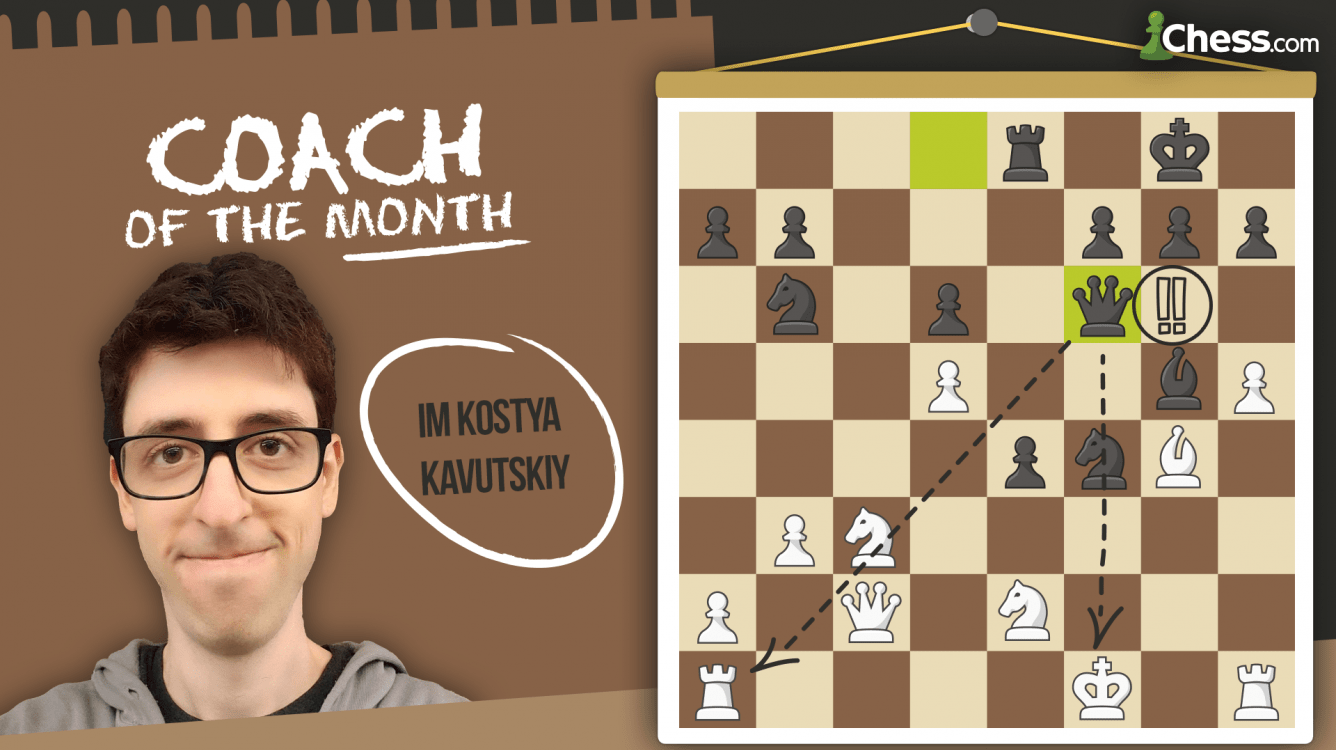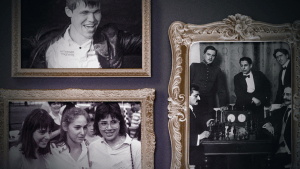
Coach Of The Month: IM Kostya Kavutskiy
If you are a chess player on the internet you have almost certainly seen IM Kostya Kavutskiy. Whether he's streaming at ChessDojo, uploading to his YouTube channel, or commentating on Titled Tuesday, Kavutskiy is always offering entertainment and insight.
Those insights also make him an excellent coach. So, without further ado, here's the Chess.com Coach of the Month for August 2021, IM Kostya Kavutskiy.
Readers seeking private instruction can contact IM Kavutskiy via his Chess.com profile and can find other skilled coaches at Chess.com/Coaches.
At what age were you introduced to chess, and who introduced you?
I learned chess at the age of four from my late grandfather, Abraham. He taught me one day after school because (I suspect) I had too much energy running around the house!
What is your first vivid memory from chess?
I somewhat recall playing my first ever game with my grandfather. I couldn't tell you anything that happened over the board, all I remember is that I lost, got very upset, and cried so hard my nose started to bleed. Of course, that would be far from the last painful memory of the game that I would make!
Which coaches were helpful to you in your chess career, and what was the most useful knowledge they imparted to you?
I've worked with a lot of people and would like to include them in chronological order: my dad, Jay Stallings, Alex Potievskiy, Aba Shagalovich, IM Jack Peters, GM Var Akobian, IM Armen Ambartsoumian, GM Ronen Har-Zvi, GM Elshan Moradiabadi. If I have left someone out, I sincerely apologize!

I learned a lot from my coaches, and owe everything to them. GM Akobian taught me the value of stubborn defense and sacrificing for the initiative. IM Ambartsoumian helped me develop a dynamic sense of the game. GM Har-Zvi gave me a lot of practical advice when it came to choosing openings and making decisions at the chessboard. GM Moradiabadi was crucial in helping me reach the final IM norm. The main thing I took away from him is that every newly minted titled player must bring something new to the game.
Which game do you consider your "Magnus Opus"?
The following game was played in an IM-norm event after I spent months working on my "dynamic chess." In the past, I used to be a player that was afraid of sacrificing material, but after studying GM Alexei Shirov's Fire on Board I felt like a completely different player—though it was only after playing this game that it became clear that all my hard work had actually paid off. Hence to this day, I'm still quite proud of this one, despite whatever stupid Stockfish 14 says!
How would you describe your approach to chess coaching?
I believe people are much more willing to "work" and "train" when they feel a genuine interest in the rich history and culture of chess. I feel like my main goal as a coach is to help students cultivate a curiosity for the game so that they can feel inspired to work on their own, and so that their training stops to feel like actual "work." Rather, it becomes something they look forward to.
There are so many geniuses in chess history, and their games are all out there, ready to be studied. To name a few: Tarrasch, Capablanca, Botvinnik, Tal, Fischer, Geller, Petrosian, Karpov, Kasparov, Ivanchuk, Shirov, Kramnik, Anand, Topalov, Carlsen, Aronian, Caruana, I mean the list goes on and on and on—so many amazing players to choose from. Whatever your favorite opening is, there are probably at least a dozen grandmasters you could study and learn from, who can show you exactly how to play the middlegames you're always seeing.

And there are so many amazing books out there, already written, just waiting to be read. If the curiosity and motivation are there, I think there is very little stopping a truly ambitious player—so my approach to coaching is to encourage a deeper interest in the game, to get my students to not worry about their short-term rating goals, and to combine that with specific and practical advice as to how to actually work on one's chess.
What do you consider your responsibility as a coach and which responsibilities fall on your student?
I feel that with all the books, courses, and resources one could possibly need to improve already out there, a coach's main responsibility is to advise their students what to work on and how to work on it. Simply put, it's the coach's job to set the training plan, and it's the student's job to follow it!
What is a piece of advice that you give your students that you think more chess players could benefit from?
Don't worry about your rating, and focus on improving your chess. Whatever your immediate rating goal is, whether it's 1200, 1600, 2200, etc., you're still going to want to improve after that. So you should think about the long-term and what kind of player you wish to become, and then do the things you think will get you there. Otherwise, you'll be starting from scratch every time you achieve an arbitrary milestone. If you're 1775 and just trying to get to 1800, you should instead be thinking about what it'll take to get to 2000. You're already at 1800, one or two lucky games and you'll get there. The next day you'll drop down.

Your strength doesn't fluctuate on a daily basis, only your form does. But if you want to improve a lot, you have to think about it from a long-term perspective. It often takes 3-6 months of hard work before people see any kind of significant results. Focus on enjoying the part where you learn more about the game, and the rating will eventually follow.
What is your favorite teaching game that users might not have seen?
Tarrasch vs. Steinitz from 1898 is a simple yet elegant masterpiece.
What is the puzzle you give students that tells you the most about how they think?
I like this one. I got it from the incredible book Imagination in Chess, by Paata Gaprindashvili. The chapter it's from, titled "Mental Agility," has a lot of good puzzles which can help assess whether a player is flexible in their calculation.
White has a lot of good moves here, but the simplest win is 1.Qg5+ Kh8 2.Qe7! with a decisive double attack (2...Rb8 3.Qe5+). Many players start by calculating 1.Qg5+ but don't notice 2.Qe7 because they don't truly stop and think after 1...Kh8 to look for candidates.
Of course, it's also hard to find "backward" moves. Qg5-e7 is not a backward move exactly, but it does reverse the direction from where the queen came from, which is hard for a lot of players to consider.
Do you prefer to teach online or offline? What do you think is different about teaching online?
Although I find it quite convenient to teach online, and it's great that you can connect with anyone in the world, there is nothing like just moving the pieces around with a student to get a sense of their feeling for the game. So I have to say I prefer teaching in person. Fewer distractions, more personal connection!

What do you consider the most valuable training tool that the internet provides?
There are a ton of amazing tools out there, but I'm a big fan of Chess.com Drills, especially the Endgames section.
So many people think they "know" a particular endgame (for instance the Lucena and Philidor rook endgames) but then completely bungle it once they have to prove it with seconds on their clock. Drilling theoretical endgames is crucial to being able to consistently execute them over the board.
Which under-appreciated chess book should every chess player read?
Excelling at Chess by GM Jacob Aagaard. It's the first in a series for advanced club players (1800+) but is very accessible, and is all about how to be a "real chess player", i.e. what to actually focus on both on and off the board. It was an absolute joy to read when I was a club player myself and I can't recommend it enough.
Prior Coaches of the Month:
- GM Arturs Neiksans
- NM James Canty III
- IM Levy Rozman
- CM Gabor Horvath
- Colin Stapczynski
- NM Bojan Lukajic
- IM Mateusz Bobula
- IM Attila Turzo
- GM Max Illingworth


